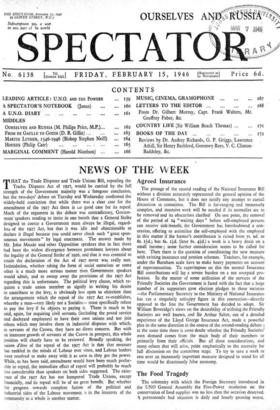NEWS OF THE WEEK
THAT the Trade Disputes and Trade Unions Bill, repealing the Trades Disputes Act of 1927, would be carried by the full strength of the Government majority was a foregone conclusion, but the two-days' debate on Tuesday and Wednesday confirmed the widely-held conviction that while there was a clear case for the amendment of the 1927 Act there is Lo good case for its repeal. Much of the argument in the debate was contradictory, Govern- ment speakers tending to insist in one breath that a General Strike designed to coerce a Government must always be illegal, regard- less of the 1927 Act, but that it was idle and objectionable to declare it illegal because you could never check such "great spon- taneous movements" by legal enactment. The answer made by Mr. John Maude and other Opposition speakers that in fact there had been the widest divergence between prominent lawyers about the legality of the General Strike of 1926, and that it was essential to retain the declaration of the Act of 1927 never was really met. Intimidation, whether taking the form of social ostracism or some other is a much more serious matter than Government speakers would admit, and to sweep away the provisions of the 1927 Act regarding this is unfortunate. The political levy clause, which re- quires a trade union member to signify in writing his desire to contribute to the levy, is obviously less open to objection than the arrangement which the repeal of the 1927 Act re-establishes, whereby a man—very likely not a Socialist— must specifically refuse to pay the levy if he objects to paying it. There is much to be said, again, for requiring civil servants (including the postal service and dockyard employees) to have their own unions and not join others which may involve them in industrial disputes with which, as servants of the Crown, they have no direct concern. But with an immense growth of servants of the Crown in prospect, this whole position will clearly have to be reviewed. Broadly speaking, the raison d'être of the repeal of the 1927 Act is that that measure has rankled in the minds of Labour ever since, and Labour leaders were resolved to make away with it as soon as they got the power. While, as has been said, amendment would have been much prefer- able to repeal, the immediate effect of repeal will probably be much less considerable than speakers on both sides suggested. The exist- ence of the 1927 Act has not hampered Trade Unions, except financially, and its repeal will be of no great benefit. But whether the progress towards complete fusion of the political and industrial sides of the Labour movement is in the interests of the community as a whole is another matter.


























